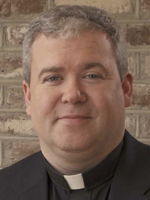Editor’s Note: This column is part of a series on death and dying.
God’s judgment after our death is an uncomfortable subject. It’s a topic that many in our society just avoid or deny in some way or another. The reality is overwhelmingly just passed over.
With this backdrop, there are certain predominant cultural trends. We regularly hear, “He’s going to a better place.” It almost appears that heaven itself is being replaced by the assurance of this “better place.” In this presumption, the possibility of hell is rejected, and we are told that the only thing which is necessary for us to reach this better place is that we die. Death becomes the only condition for an undefined eternal bliss. The underlying belief in this trend is that all dead people deserve and are in this better place.
But our lives, and the way we use our free will, are far too significant for such an empty system of beliefs. Our capacity for greatness and holiness are not adequately acknowledged in this system. And the temptation towards evil and maliciousness is too serious a reality to smooth over and normalize.
Where is Jesus and the biblical notions of judgment, heaven, and hell in these cultural expressions? Where is love and our call to holiness? Where is our faith and hope?
If eternal salvation was as superficial as some believe, why did God become a man and die on the cross?
In drawing close to the Lord Jesus, we should ask the pressing question, voiced in the Gospel by the Rich Young Man: “What must I do to inherent eternal life?” (Lk 18:18)
This revealing question cuts through human presumption on one side and despair on the other. The Lord gives an initial answer to the question, he tells us simply, “Follow the commandments.”
In his public ministry, Jesus repeatedly announces that he has come to make us “fit” for the kingdom of God. The commandments are our first teachers, and they prepare our hearts for virtue and the deeper workings of God’s grace. In this opportunity, given to us by Jesus, we each have the task of “working out” our salvation. We aspire to become better people after God’s own heart.
As we follow the commandments, love summons more from us. Jesus eventually says to each of us, “Sell everything. Come, follow me.” We are called to give everything to Jesus and seek to be completely transformed by his grace.
In this process, we change as persons: humility tempers pride, forgiveness heals retribution, kindness disintegrates anger, and we begin to see the visible signs which teach us about heaven. We know that we are being made fit to live in that kingdom. This is our task in life, and this is why God became a man and died and rose for us.
As human beings, made in God’s image, we live forever. But where we will live in eternity is determined now. We will die and live eternally as we have lived in this earthly life. If pride, lust, anger, envy, and the kingdom of sin and darkness have ruled our hearts, and we do not seek the help of God, then the pattern will continue, and we will live eternally in that wayward kingdom, which is called hell.
If, however, we draw close to Jesus and, in the failures and successes of our discipleship, we hope in him, and try to cooperate with his grace and be transformed into better people, then the pattern will continue and we will live in that kingdom of light which we sought in our earthly lives. We will live forever in heaven.
Father Kirby is a priest of the Diocese of Charleston, currently in Rome studying moral theology.

